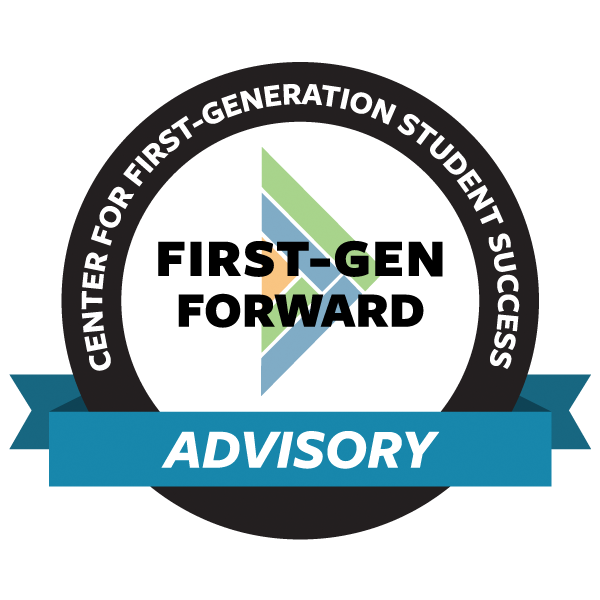
Office of First-Generation Support and Engagement
The Office of First-Generation Support and Engagement serves Hofstra’s first-generation student population through social and educational programming, community engagement, and through the sharing of important college knowledge for students and families.
- Home
- Office of First-Generation Support and Engagement
What is a First-Generation Student?
Hofstra defines first-generation college students as students for whom neither parent has earned a four-year college degree in the United States. Research shows that nearly one in three college students are first-generation students in their families.
Being the first in your family to attend college can be intimidating, but rest assured that you belong here! There is a community of proud first-gen students, faculty, and administrators on campus that are here to support you and help you find your place in the Pride!

As a First-Gen Forward institution, Hofstra is dedicated to improving the experiences and advancing the outcomes of first-generation college students. Read More.
Info For You
Need to Know
Information to help first-generation students at Hofstra.
Information to help those supporting first-generation students at Hofstra.
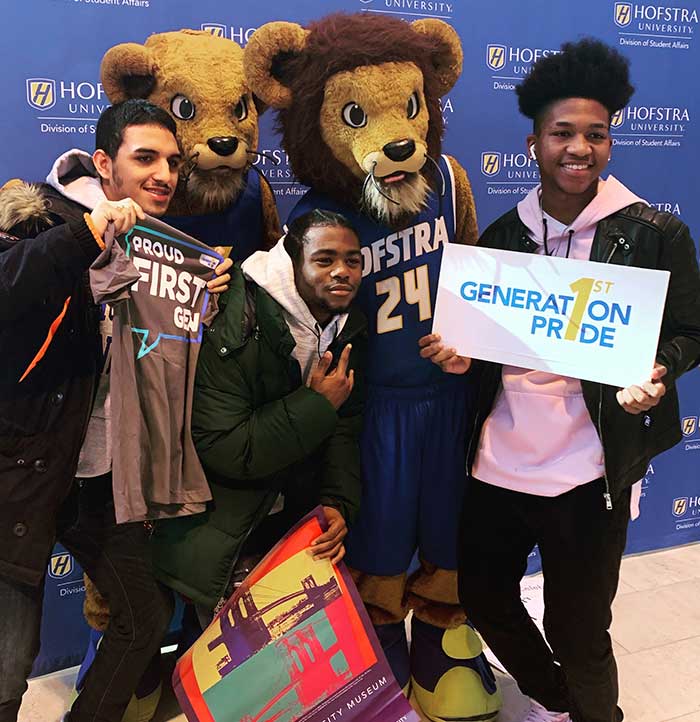
Support at Hofstra
Here for You
Meet the First-Gen Committee and some first-generation faculty who are here to support you, read stories of their first-generation experiences, and connect with first-generation alumni.
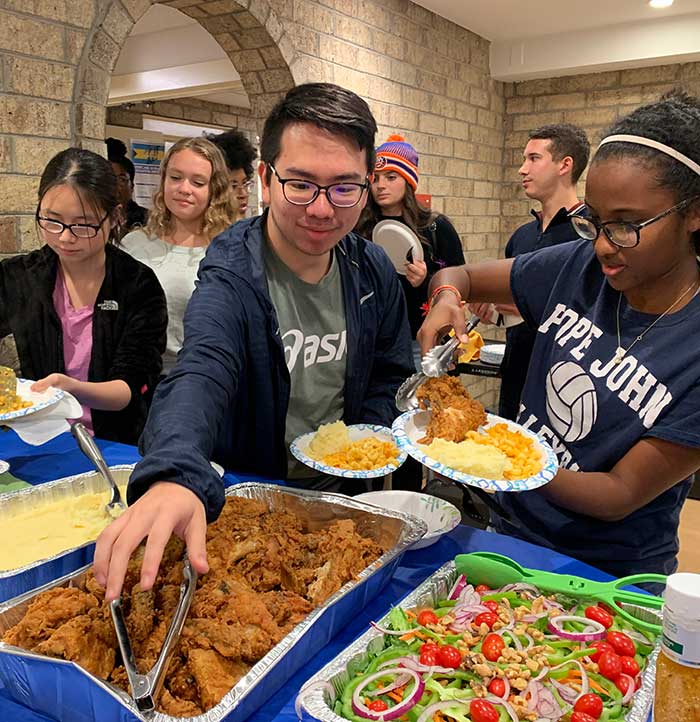
First Generation Stories
- "Staying true to yourself" – Juan Ortiz
- "That’s the funny thing about being first gen– you’re always panicking about the smallest things" – Dary Felix
- “I still felt as if I was just scraping the surface” - Tristan Baharally – Alumni
- "I was just trying to keep my head above water" - Alumna Mia D’Angelo
- "Hardship Is Not Failure" - Andrea Rosso Efthymiou
- "My res hall was the nicest place I’d ever lived" - Russ Smith
- "I didn’t give myself enough credit" - Diane Herbert
- "What the (Heck) is a Bursar??" - Darlene Johnson
- "On Not Going It Alone" - Kris Lotier
- “I Didn't Know What I Didn't Know...” - Beth McGuire
- “Finding your First-Gen Career Zen” - Sabrina Iaria
- “I Wanted to Make my Parents Proud” - Branka Kristic
Contact Us
The Office of First-Generation Support and Engagement
Student Center 263B
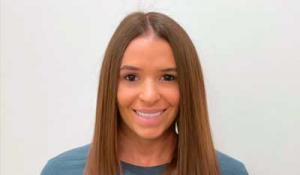
Mia D’Angelo
I remember the questions piling up like a ton of bricks…“what college do you want to go to?”, “what’s your major going to be?”, “what about a minor?”, or the biggest question of all, “what do you want to do with your life?”. They all felt so life-altering and final, like whatever I picked was going to make or break the rest of my life. I knew college was the right next step for me, but when I looked around, I felt like everyone had the answers – like they had some sort of blueprint on how to navigate their futures, while I was just trying to keep my head above water.
My dad is an HVAC Technician and the hardest working person I know. My mom stayed at home to care for my brother and me most of our lives. They were supportive in every way that they could be, but at the end of the day, we were all navigating the college process for the first time. For me, deciding which college I was attending, came down largely to the financial aid I received (thank you Hofstra, for your great scholarship program) but just when I thought my head was going to explode over the college admission process itself - insert the college financial process! I still remember staring blankly at the FAFSA paperwork, not knowing where to start. I also needed to work while attending school to pay for my additional living expenses. I had a job on campus, and also worked at a clothing store in the nearby mall.
While in the moment, this all felt like a curse - especially when I had to often times sacrifice social activities and outings with friends, for work shifts. The reality is, that it was a gift. I look back at the skills I developed early on and am so grateful for my experiences throughout this time period in my life.
I definitely felt an added pressure being the “first” for everything in my family. I felt like I always had to do things “right” to prove a point and convinced myself that I never needed help, to validate the fact that I belonged. I was focused on looking like I knew what I was doing on the outside, even though I felt lost internally.
Looking back, I wished I leaned on the community and resources I had available to help ease the burden I felt and help me make more informed decisions along the way. To be clear, I made a TON of mistakes while navigating this process, but just know, that’s OK. Being on the other side of it now, I actually feel that most of my mistakes, taught me the majority of my most valuable lessons to date.
From the start of the college process, I had to quickly rely on being resourceful and a problem-solver. While attending undergrad, I had to learn effective time management skills, discipline, and determination, to balance my academics, two jobs, and a social life. I also learned that asking questions is a strength, not a weakness and that leaning on those around you actually can make you more relatable and can forge stronger relationships with others. I am so grateful to have found amazing friends and mentors at Hofstra (shout out to Professor Frisina), many of which I am still very close to today.
I’m overjoyed that Hofstra started First Generation Pride. Being the first to go to college in your family can feel stressful, scary and lonely, but do not lose sight of the fact that it is also exciting, rewarding and a milestone that you will look back on and be forever proud of.
To all my fellow First-Gens, know that this experience is once in a lifetime and that there is an incredible network here to support you (myself included). Enjoy this time, the good and the bad, as all of it is going to be valuable and position you for success in all that lies ahead!
Mia D’Angelo
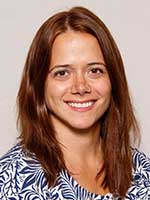
"Hardship Is Not Failure" - Andrea Rosso Efthymiou
On my fifth-grade report card, I earned a C+ in history, the lowest mark I had ever received up until that point in my life. My dad, a fork-lift operator working for city government and the son of an immigrant father, convinced me that my fifth-grade-C+ would follow me all the way to my college application: “When you try to get into college, they’re gonna look at that C!” Looking back, I understand that, although my dad did not have a clear sense of what college admissions necessitated, he believed that a college education was the key to ensuring his only child would have more success in her life than he achieved in his. He and my mother, who earned an associate’s degree at a time when women were groomed as typists, were so proud, and so emotional, when dropping me off at UCLA in September 1994 to start my first year of college. My entire family—mom, dad, yiayia, a cousin, and two friends—caravanned the 315 miles from rural, Central California to urban West Los Angeles to start a future full of hope. I was fulfilling the dream that my mother had wished for herself, that my father had tried but couldn’t accomplish, that embodied all the potential my family felt possible.
But once on my own at a massive research institution, I realized how very hard it was to be the first in my family doing this college thing alone.
After the whirl of new friends, the excitement of unsupervised time in the dorms, and the thrill of simply hanging out in the middle of a school day had worn off, I realized that I struggled in my classes, not fully grasping the expectations my professors had of my work. I had trouble navigating financial aid forms and didn’t understand the consequences of my school loans until long after I graduated. At the time, I feared talking to my parents about these challenges, not because I thought they would be upset, but because I didn’t want to let them down. I knew how much they believed in me, the star student who was always a high achiever (particularly after that shameful fifth-grade C+); to express hardship was akin to admitting failure. Despite this fear, the rare times I did talk to my mom about how hard college was academically and financially, she had few solutions and little advice, offering only the everything-will-be-alright, because after all, she had no first-hand experiences on which to draw. My mother couldn’t say, “What about your assignment is giving you trouble?” or “Go to office hours” or “Have you asked about tutoring?” And because the 90s were a time before we used language like “first-generation college student,” there was little to no support from faculty or administrators for students whose families did not share in the college experience.
But starting a new journey means creating a new community. Serendipitously, many of my closest friends at UCLA were also first-generation college students. We consoled each other through tough classes and pointed each other in the right direction down intimidating hallways. As an educator and administrator today, I know that having a community to share my struggles and seek guidance was crucial to achieving my undergraduate and graduate degrees.
In light of my journey, I’m proud to be part of an institution that is committed to supporting students who are first in their families to pursue bachelor’s degrees, offering the resources and networks that position Hofstra First-Gen students to feel safe asking questions on their path to college success. While challenges come with all worthy pursuits in life, I want to personally tell Hofstra First-Gen students that there are people who will listen to your experiences and do their best to answer your questions. I want to hear your story. Come see me in the Writing Center or stop by my office anytime!
Andrea Rosso Efthymiou, Ph.D
Assistant Professor, Writing Studies & Rhetoric
Writing Center Director
"My res hall was the nicest place I’d ever lived" - Russ Smith
The day I moved to college, I woke up around 4 am to get ready. My car was already packed, and my mom was getting ready for work. A high school drop out, she had gotten her GED while I was in middle school. I said goodbye to her, and drove from my hometown in Kansas, across the state of Missouri, to my new college in St. Louis. When I arrived, I was told to drive my car into a circle drive, and immediately people opened all my car doors and pulled out everything I owned and put it on a nearby tarp. I was then told to go park my car, and go inside to check in and get my room key – that all my stuff would be in my room by the time I arrived. I remember being terrified that it would all get stolen, but I had no choice but to comply. I breathed a sigh of relief when I turned the key in the lock and my belongings were all accounted for.
I spent the day quietly unpacking. I heard the families in rooms around me complaining about the space, and I was shocked. I had hardwood floors and an air conditioner in my room – this was the nicest place I’d ever lived. My new roommate arrived with his parents, but as he only had two suitcases, they quickly left. My RA, Jenn, asked where my family was, and I told her that they were at work. I couldn’t understand why everyone's parents were there to help them move in – It was a week day. Didn’t they have to be at work also?
I went to college with $600 in my pocket. I had saved $300 from working all summer, and my mom and step dad gave me $300 – all that they could contribute to my college expenses. That was to last until I found a way to make more money – I was officially on my own.
The next day, I had to go buy my text books, and quickly saw $400 of my $600 go away. (This was before the days of used books on Amazon, or renting books from Chegg. I had to buy what was in the bookstore) I only had $200 left to last until December.
Because of this, I had to learn quickly about work study jobs, and I got myself one. I also heard about jobs at The Gap at a nearby mall from a friend on my floor, and got a job there also. While I didn’t feel like my background gave me much to share in common with those living near me, it didn’t stop us from learning about each other and ultimately becoming friends. Many of these friendships continue for me 18 years later.
Because nobody in my family had ever been to college, I didn’t have anyone to ask what to expect. Looking back, however, the process of having to figure it all out for myself made me a much stronger person with great problem-solving skills – but all that came at the cost of feeling constantly like I did not belong. I always felt like someone would figure out that I shouldn’t be there, and I’d be asked to leave. I’ve since learned that there’s a name for that – Imposter Syndrome – and many others feel it too. I wish that there had been a supportive community for me to be a part of, where I would not have felt like this. It doesn’t have to be that way at Hofstra, though. I’m so proud of the work that’s being done here to create a community of pride and support for first gen students. There are a ton of faculty, administrators, and other students who want to help you and see you succeed because they remember what it felt like to be in your shoes. Don’t be too afraid to take advantage of that. The support of these individuals can lead directly to you reaching your educational and career goals.
-Russ Smith
"I didn’t give myself enough credit" - Diane Herbert
I didn’t know what it meant to be a first-generation college student when I started as a freshman at SUNY Binghamton. To be honest, I never thought about the unique aspects and challenges of being a first-generation college student until a few years ago, about 25 years after earning my bachelor’s degree.
I am extremely proud of my academic accomplishments, especially when I stop and give thought to the fact that my mother didn’t graduate high school and my father didn’t continue his education beyond high school. But when I think back on my first year of college, I distinctly remember feeling self-conscious and concerned about whether I was as smart as other students who got into the same college as me. I saw myself as a hard worker and was confident about my commitment to my schoolwork, but I never gave myself credit for being smart and was anxious about whether I had the same capacity for success. This was especially true in classes where life experiences and personal background contributed to class discussions. I was not “worldly” at all. Growing up I had only one family vacation outside of my home state. There were no political discussions in our home and no trips to museums or famous landmarks. And, any focus on academics was prompted by my own internal drive rather than parental expectations.
Reminiscing on my undergraduate (and graduate) school years makes me realize how much I would have benefitted from knowing other students who had experiences similar to mine, as well as knowing staff and faculty at my school who could have guided me through some of the unique challenges that I was facing as a first-generation student. I would have asked questions and embraced feedback on time management, budgeting, major and career exploration, realistic goal setting strategies, and many other thoughts that were going through my head at the time. It is for these reasons that I am so proud of Hofstra’s commitment to support our first-generation students and why I choose to be involved in this resource. I encourage all first-generation Hofstra students to attend some of our tailored events and take the time to connect with at least one first-gen student and Hofstra staff or faculty member. I hope you’ll reach out to me!!!
-Diane Herbert
"What the (Heck) is a Bursar??" - Darlene Johnson
I started college at St. John’s University in September of 1987. Yes, that was a long time ago. I don’t remember everything about that first week of school. I do remember that I absolutely loved my white boots with fringes on them. I remember that I got completely lost finding my first class, located in the school library (who would think that a class would be in the library??) and I remember thinking to myself “what the (heck) is a bursar?”
Back then everything was done in person. On line meant that you had to actually wait, on a line. A very long line. But that was only after you figured out where you were supposed to go and why.
I remember having to go to both the registrar and the bursar, but having no idea what these were. Remember, this was before Google (I will give you a moment to get over the idea of living without Google…) I didn’t have a family member to ask. None of my friends from high school continued to St. John’s. I was alone and felt very much that way. I made mistakes choosing my classes. I was asked questions that I did not know the answers to. I got lost, literally and figuratively.
Before long I made great friends. One friend’s father was actually the chairperson of an academic department at the school. Score! I remember being so impressed and surprised about that. I never knew someone who had a parent that was a professor, let alone a chairperson. I now had this great connection. Someone who could answer my questions. Sometimes all it takes is one good contact to start off your academic career.
So, I would suggest that any student, first-gen or not, find that one person who can answer your questions. That person can be a fellow student, professor, career counselor, academic advisor, etc. Eventually your network of people will grow, but having one person in your corner from the start can make a world of difference.
The first generation committee members are happy to be that person for you! Don’t hesitate tor each out to us. We remember the challenges, but we also remember the rewards that come with putting yourself out there!
Darlene Johnson
Director of External Relations for The Career Center
"On Not Going It Alone" - Kris Lotier
Other times, though, you may feel like it wouldn’t matter that much if you failed. At least then you’d fit in better back where you came from.
Being the first means that you’re different, even exceptional. That can be a good thing, and it’s something to celebrate, but it can also be a hard thing. It’s ok to admit that.
I am a fourteenth generation Pennsylvanian and, so far as I know, a first-generation full-time college student. (My parents did eventually earn college degrees, but they took night classes while working full-time jobs. As a result, I’m much more proud of my mom for earning her associate’s degree than I am of my own doctorate.)
I was blessed in all sorts of ways to go to college at all, but I felt pretty lost once I got there. If any of my friends were first-generation students, they didn’t talk about it. And they all seemed to know what to do in college and how to do it. I didn’t know how to navigate even the most “basic” tasks, like registering for classes or scheduling meetings with advisors. I had no idea what would happen if I went to see my professors in their offices, so mostly I didn’t go. I didn’t know who to ask for advice—and so I followed some bad recommendations at points.
Eventually, I learned that it’s alright to ask for help, even to ask for help from the same person more than once (or twice, or however many times). I learned that most professors and support staff could be doing other things with their lives instead, but they’re doing what they’re doing because they want to help students succeed. I also learned to ask for second and third opinions when the first one didn’t seem quite right. I learned that even well-meaning professionals are busy and they can make mistakes. So, I slowly learned how to double-check some things on my own. You can, and you I hope you will, learn all of those things too.
I’m proud to be working at an institution like Hofstra that’s serious about helping first-generation students navigate the particular challenges that they alone face. And I hope this message, and the efforts of the First Generation Committee to create a supportive and encouraging community, help you to feel a little bit less alone.
“I Didn't Know What I Didn't Know...” - Beth McGuire
I knew that I wanted to have a college experience and lived in a community where it was expected that I attend college but I had no idea what that really meant. I am one of 8 children in my family and there are large age gaps between the oldest and the youngest of the eight. When I was filling out my college applications and financial paperwork my oldest sister was helping her oldest son with the process too. I remember thinking “good, she can help me!”.
Until that point in my life I had never really heard about my parent’s education levels or their college experiences. I had never noticed that there weren’t any diplomas hanging on the wall or college memorabilia around the house. Through my college application process, I found out that my mother didn’t even have a GED! I couldn’t believe it. She was the smartest person I had ever met. She was a voracious reader who read on average about 4 books per week. She had a Physicians Desk Reference book on her nightstand and would often look up the counterindications for the many asthma medications my younger sister Maura was taking. Each night as a family we would watch Jeopardy and as usual my mother would run through all the categories getting every one of them right. She was incredibly intelligent yet not formally educated. Through my application process my mother began her own journey of formal education and started with her GED. Next, she applied to community college and started taking classes. My mother and I were going to college at the same time, comparing marks for our first college papers. It was a surreal experience and taught me a lot about persistence.
My college journey started with a community college too. At the time I didn’t know about the resources that were available to me. I didn’t know what classes to take or what major to declare. I kept changing my major and took so many classes that when I transferred to Stony Brook University I transferred in with 89 credits! I realize now that I needed to ask more questions, reach out for help, but I felt embarrassed, like I was the only person who didn’t know what they were doing. I felt ashamed to admit that I didn’t get how the whole college system worked.
At Stony Brook University I met some great administrators who took the time to get to know me and guided me in a way that helped me explore but also focus on my future endeavors and what I wanted them to be. I consider myself lucky that I fell into the RA position which educated me about how to provide resources to my floor and my students. These were resources that I needed too. Through my RA experience I realized that student affairs was the field that I wanted to work within. Helping students achieve their goals and persist through challenging times was my calling. While the struggles of being a first-generation student are real and pose many challenges, I am grateful to work in a field that recognizes those challenges and meets those challenges with support and resources.
Beth McGuire
Senior Assistant Dean of Students & Director of Residence Life
“Finding your First Gen Career Zen” - Sabrina Iaria
Six years ago, I was staring at my computer, ridden with fear. In front of me was the Common App, but behind me there was no one. No one who could help guide me through the process of applying to college. I was the first in my family to even consider incorporating college into my long-term plan. Although I knew I had incredible amounts of support from both my parents and the rest of my relatives, I knew I had the burden of figuring out how to get where I wanted to be all on my own. Knowing that, combined with the high expectations that my family had for me, the pressure was on.
My freshmen year at Hofstra was definitely a culture shock. Being on a college campus seemed like being on another planet, filled with aliens that were accustomed to life on Mars. Although my new normal was nothing shy of exciting, there was a slight feeling of insecurity, as if I did not belong here. I kept this feeling to myself, both because I did not want to hurt my parents’ feelings and I knew they could not relate.
Looking back, I was lucky enough to find my niche at Hofstra, specifically in career services. I started working in the Career Center as an undergraduate assistant and opted to make a career out of it. Although I attribute my success to both my Hofstra journey and my support system, there are some things that I would’ve done differently. I can now clearly see the advantages that I have in the workforce as a first-generation student. I had to go the extra mile to get where I want to be, which goes hand-in-hand with the work ethic that I learned as the daughter of parents who had to compensate for their lack of degrees. The transferable skills that I have acquired as a result of my upbringing will carry me through all future endeavors. I encourage all first-generation students to approach their college experience with this attitude and find ways to connect with other first-generation students that share your thoughts and feelings. This is an aspect of myself that I am more than proud of and you should be too!
Best.
Sabrina Iaria
Graduate Assistant of External Relations
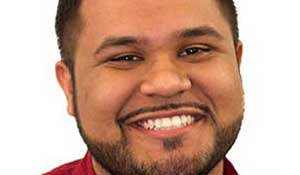
Tristan Baharally
M.A. Industrial-Organizational Psychology, 2019
I grew up in diverse Queens, NY, so throughout my life I’ve been exposed to an incredible amount of diversity. This exposure was only strengthened throughout my education - I was a part of the NYC public school system my whole life; this idea of being a “first-generation American” (let alone student) wasn’t a part of my vocabulary. The idea that I was a “first-generation” came about when I started to look for a college to attend.
What I initially perceived to be a challenge started when I was applying for undergraduate programs - I sat there, in my high school’s pale blue college office, staring at a list of schools that I heard about and researched. I went home that day and I sat there for hours on my loud, overheating laptop applying to these schools. My parents, although supportive throughout, didn’t know how to navigate this part of my life - it was unfamiliar territory since my mom never got a college education, and my dad, due to family experiences in their home country didn’t have a robust education either.
I remember opening my first acceptance letter with excitement - the family surrounding me and smiling. Fast forward a few months and you would see me choose to attend Adelphi University, where I studied Psychology, with minors in Marketing and Human Resources Management.
Those four years at Adelphi University opened my eyes. I started to feel like a “first-generation.” I saw my peers around me that weren’t first-generation Americans getting opportunities that quite frankly, I didn’t know existed. I saw my peers reaching new heights while I still felt as if I was just scraping the surface. I also saw my fellow first-generation friends feel the same way I was feeling - behind.
I didn’t let this feeling pull me down - I couldn’t; my parents were watching, hoping that I would become one of two success stories in the family - they’ve given my brother and I so much to get me to that point, I couldn’t disappoint them.
I took on leadership positions and experiences which guided me to attending Hofstra University for my Masters degree. At this point, I realized that what was once a perceived challenge was an incredible opportunity - an opportunity to build from the ground up and tell a story that others are facing. At Hofstra, I continued to take on leadership positions and build a network so that I can show my parents that my brother and I can take the steering wheel and guide ourselves with their support.
Being a first-generation student and a first-generation American was an incredible challenge at first - one that I didn’t even know existed. In fact, as I type this, I realize that my experiences have taught me a lesson that my parents have been trying to teach me my whole life - challenges aren’t setbacks, they’re opportunities to become a stronger person.
Tristan Baharally

Dary Felix
I want to tell you all about what my experience has been like as a first-generation student. First, I just want to say that I cannot believe how fast these last four years have gone for me. I remember just yesterday I migrated from the Dominican Republic to the United States leaving all I had known behind. I was living with my older sister and a nanny for a couple of years while my parents were here in New York working and trying to make a living for us. This was really hard for me because I was living my childhood without the love of my parents, but now looking back 17 years later I understand why that had to happen.
I went through many obstacles while growing up that shaped me into the person I am today. Many first-generation students have faced the same obstacles that I have faced– like living with a struggling single parent, being homeless, and helping my sister who was a teen mom. Seeing my family struggle so much throughout my years of living in the country that we came to seek better opportunities, pushed me to become the first to graduate high school, college, and now to pursue my master’s degree. I come from Brooklyn where there aren’t many opportunities being provided for students like us, it’s just expected that we know how to do simple things such as filing for FASFA. To this day I have nervous breakdowns filing for my FASFA because I am not sure if I am doing it correctly.
However, being from New York had its perks. I was introduced to the HEOP, EOP, and SEEK programs which are scholarship programs for low-income families. I was lucky enough to be introduced to the NOAH (New Opportunities At Hofstra) program here at Hofstra. This program is the backbone of my college career and if it wasn’t for Dean Smith and Ms. Aguilar I would not be the successful and confident person that I am today. Thank you for that.
I always find myself thinking back to the time I got the email that I got an interview for the NOAH program. I was at a family friend’s birthday party. It was around 1 am and I had this huge urge to just check my email in the middle of this party. I was in high school, so it was rare for me to check my email, but this night was different. In the end, it sure was because I found out I had this interview for a school in Long Island. Looking back, I think it’s so funny. I thought that Long Island was like hours away and I was panicking about how I was going to get there. I started hyperventilating and doing all of this research on how I could get there and how long it would take for me to get there. And that’s the funny thing about being first gen– you’re always panicking about the smallest things because you have no one to guide or help you ease these anxieties.
Throughout my time in college, the hardest obstacle I faced was being able to manage my mental health, especially through COVID. I come from a Hispanic household where depression and anxiety are not a real thing, and it’s just something that’s made up and can just go away. Being away from home taught me to be comfortable in my own skin and be able to process my emotions. The way I was able to overcome this was by reaching out to people who I knew were there for me, allowing myself to be vulnerable, and putting myself out of my comfort zone. This taught me to be able to learn how to love myself and the people around me. To me, being first gen is not only about being the first to graduate but being the first in your family to break generational barriers. This doesn’t only come with school but with mental stability, financial freedom, and being able to influence future generations. I fought my way through all my hardships because I want to be an example for my little sister, niece, and nephew to show them that they can be vulnerable and still be strong. I would have valued having someone in my family who was able to guide me and make this process easier. However, now that I am first in my family, I will be that resource for them and other first gen students.
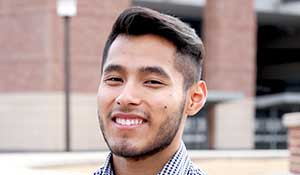
Juan Ortiz
Hi, my name is Juan Ortiz and I’m the University Recruiter for Grant Thornton in the NYC Metro Area. No, I’m not here to recruit you, instead I want to tell you about staying true to yourself. I’m a proud first-gen student who grew up in a border city in South Texas and just moved to NYC last May. My family moved from Mexico with the dream to give my siblings and I a better life. Growing up I never really recognized what being a firs-gen meant. I was raised in a border city in South Texas, so I was always surrounded by individuals who not only thought like me but looked like me. It wasn’t till I left for college at Texas A&M when I realized that my background and my story were my greatest strength in my career.
I’m not going to tell you that college was easy. I knew that my responsibility was to succeed and hopefully get a great job that pays the bills. I’m sure some of you can relate in the way that this expectation can turn into pressure quickly. I remember asking myself what is a career that would give me a good salary and allow me to give money home as quickly as possible. Having done business in high school I immediately turned to Accounting as my solution. I did a 5-year program and eventually got my MS in accounting. You would think that’s it we are home free and good to go. Not exactly, I had a huge moment after I graduated where I realized, “this is a great job, but I don’t think this is who I am”. If you recall, earlier I told you the main the questions I asked myself when I began my college career. I asked everything but the main question, what does Juan like to do?
Now before you think, “oh no he had a crisis and messed up”. No not at all, as a first-gen student our resiliency really allows us to rise from what others may think is the worst-case scenario. This is a proud virtue I can say I got from my mom as she raised me in Brownsville, TX which was once known as the poorest city in the United States. When I decided to change my career, I took a step back to understand what were the things I enjoyed doing. I immediately went back to my days back in high school, where I volunteered a lot of my time to different organizations that primarily helped other students reach their full potential. This continued in college as I joined ALPFA and provided different career and networking opportunities to my peers. Where did this stemmed from? That would be my parents and how they raised me. My mom taught me important values such as humility and compassion towards others. My dad took me to cut yards and clean event centers during weekends. This not only showed me what hard work can be, but also to never look at anybody else less than me regardless of their position. I’ve been in the lowest of the low and it’s not a nice feeling, and I don’t want anybody to ever feel like that again. With this in mind, I pursued a career in recruiting where I can match my knowledge of accounting and continue providing resources to underrepresented communities.
If things are hard right now and you feel a bit lost. It will be ok. Just remember to always remember where you come from. The world deserves the best version of yourself. No matter what career you decide to pursue, don’t stop sharing your values and unique culture. Post-college does not mean the end of being your authentic self, if anything it’s a larger platform for the world to see how amazing you truly are. As first-gens we are always thinking of others and how we can help our community. This is a great and beautiful thing, and I’m proud to be an example of how you can mix your passions and personal responsibilities. You can do it!
Best,
Juan Manuel Ortiz - He/Him/His – Grant Thornton University Recruiter
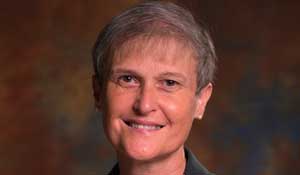
“I Wanted to Make my Parents Proud” - Branka Kristic
I was a new international undergraduate transfer student in New York City, having finished my first year at Zagreb University, Croatia. Since my elementary school days, my mom and dad showed joy and pride when they saw my good grades in school. My mom finished a two-year vocational school. My dad completed a high school when the WWII stopped his dreams of attending the University. He barely survived the war. So when I was accepted to the University, they bragged about me to everyone! For them, having a diploma was the height of anyone’s achievement.
The American university system, as I learned through many of my errors as I was applying, is different from the European universities. I almost missed the start of the semester, as my documentation arrived late from Zagreb. But I persisted. I married in my second year of college, had two young children, and worked part time when I returned to finish my degree. It was hard and challenging but love of learning and a thought of showing my diploma to my parents sustained me. Yes, they were proud!
Best,
Branka Kristic - Assistant Dean of Students and Director of Parent and Family Programs